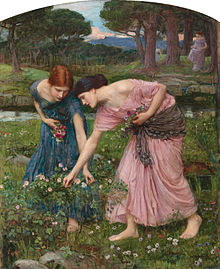To the Virgins, to Make Much of Time
This article needs additional citations for verification. (March 2016) |

"To the Virgins, to Make Much of Time" is a poem written by English Cavalier poet Robert Herrick in the 17th century. The poem is in the genre of carpe diem, Latin for seize the day. It goes as follows:
- Gather ye rosebuds while ye may,
- Old Time is still a-flying;
- And this same flower that smiles today
- To-morrow will be dying.
- The glorious lamp of heaven, the sun,
- The higher he's a-getting,
- The sooner will his race be run,
- And nearer he's to setting.
- That age is best which is the first,
- When youth and blood are warmer;
- But being spent, the worse, and worst
- Times still succeed the former.
- Then be not coy, but use your time,
- And, while ye may, go marry:
- For having lost but once your prime,
- You may forever tarry.
Theme: Carpe diem
First published in 1648 as number 208 in a volume of verse entitled Hesperides, it is perhaps one of the most famous poems to extol the notion of carpe diem. Carpe diem expresses a philosophy that recognizes the brevity of life and therefore the need to live for and in the moment. The phrase originates in Horace's Ode 1.11.
The opening line, "Gather ye rosebuds while ye may", echoes the Latin phrase collige, virgo, rosas ("gather, girl, the roses"), which appears at the end of the poem "De rosis nascentibus,"[1] also called "Idyllium de rosis," attributed to Ausonius or Virgil.
Nearly the same sense was expressed thousands of years earlier in Wisdom of Solomon 2:8, "Let us crown ourselves with rosebuds before they wither", a verse ironically given as the example of a fool's reasoning in denying the resurrection of the dead and turning to licence.
Popular culture
- The line "Gather ye rosebuds while ye may" was quoted by Rex Masters in the episode "The Animal Within" of the British television murder mystery Midsomer Murders.
- The line "Gather ye rosebuds while ye may" was quoted by John Keating (played by Robin Williams) in the film Dead Poets Society.
- In the NewsRadio (TV series) episode "Rat Funeral," Phil Hartman's character Bill McNeal misattributes the line "Gather ye rosebuds while ye may" to, as Bill McNeal often does, John Keats.
- The line "Gather ye rosebuds while ye may" is featured in episodes of two television series created by Aaron Sorkin. The line is featured in an exchange between the characters Josh Lyman and Donna Moss in the 16th episode of the first season of The West Wing.[2] The line "Gather ye rosebuds", and subsequent verse commencing at "Then be not coy, but use your time", was also quoted by Mackenzie and Jim in the 9th episode of the first season on the HBO series The Newsroom.[3]
- The poem was featured in the 2006 film A Prairie Home Companion, at the conclusion of the movie.
- The themes of this poem are featured heavily in the Dream Theater progressive metal epic "A Change of Seasons".
- The line "Gather ye rosebuds while ye may" was quoted by Sixpence None the Richer on "Meaningless", track 7 of their 1994 album The Fatherless and the Widow.
- With a slight difference, the line "Love, gather your rosebuds while you may" appeared in The Veils' "Train on fire", track 2 of their 2013 album Time Stays, We Go.
- The line "Gather ye rosebuds", and subsequent verse commencing at "Then be not coy, but use your time" was quoted and referenced by George O'Malley (played by T. R. Knight) to Izzy Stevens (played by Katherine Heigl) in the 12th episode of the third season of TV show Grey's Anatomy.
- Gather the Roses... first line is also heard in the 1962 comedy starring Jim Hutton, The Horizontal Lieutenant.
- In one episode of Open All Hours, Arkwright quotes the first line - "Well you're only young once, gather ye rosebuds will ye may." during an exchange between himself and Granville about Granville's socialising after Arkright's shop has shut for the night.
See also
- 1648 in poetry
- To His Coy Mistress, an Andrew Marvell poem on the same subject
References
- ^ "De rosis nascentibus" (in German), in a collection of the works of Virgil under the note Hoc carmen scripsit poeta ignotus ("An unknown poet wrote this poem").
- ^ "West Wing Transcripts".
- ^ http://blastmagazine.com/2012/08/20/the-newsroom-the-blackout-part-ii-the-mock-debate-episode-review/
